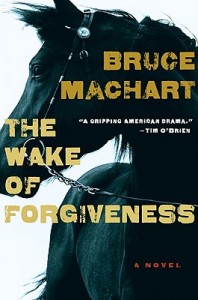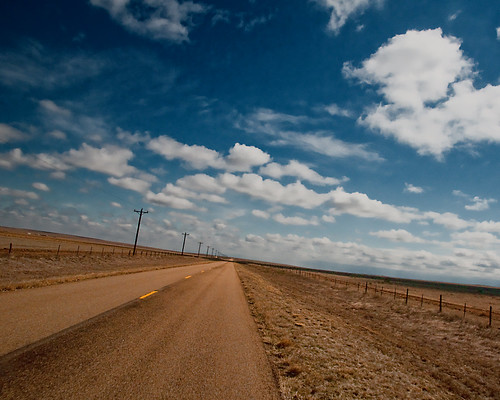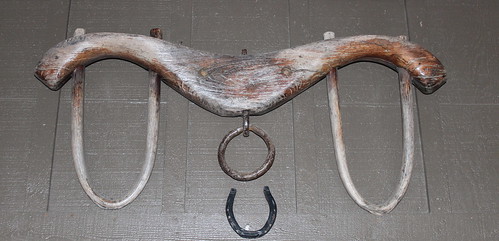It was almost exactly a year ago that I first read Bruce Machart’s novel, The Wake of Forgiveness. Two colleagues of mine had returned from the Mountains and Plains Independent Bookseller’s Conference in Denver, Colorado, abuzz about a young new author who had appeared on the literary scene, as if out of thin air. His debut, they claimed, was remarkable. Advanced reading copies appeared and were passed around, but I initially kept a safe distance on account of an innate resistance to all books praised lavishly. When I did get around to reading The Wake of Forgiveness, which I felt compelled to do because its author was visiting Salt Lake City, I was thunderstruck (and I use this expression without any possible sense of guilt over the use of hyperbole). Machart’s prose was hard, economic, and had a razor-fine edge. The first six pages, alone, were crushing, and left me feeling run through, utterly bereft. The brutal physicality of the book confidently rivals anything written by Cormac McCarthy but, miraculously, just beneath its unyielding exterior, like a whisper in an empty room, lies a numinous spirituality, the subtle luminescence of the human condition, and it is the balance between these two elements that makes The Wake of Forgiveness such an exquisite book.
There is a good deal of anticipation for Machart’s forthcoming collection of short stories, Men in the Making, out on October 25th. Although comparing short stories to a novel is something akin to comparing peas to carrots, it was a relief to see some of the same hard prose in the shorter pieces. The stories, like the novel, seem to deal with the navigation of a large indifferent world by a soul in a body. The tension between the physical body, with all its hungers and desires, and the ghost in the machine, the internal voice that has been molded by everything it has seen and done, is still, ever, an integral part of this work. In the novel, which follows two families in Dalton, Texas, one father, Villaseñor, is hungry for a long lasting family dynasty, while another, Vaclav Skala, is hungry for land, the Skala boys are starving for affection, and Karel, his youngest son, longs for absolution.
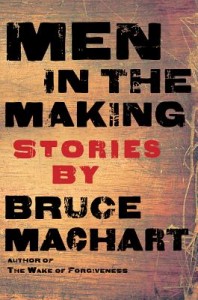 In Machart’s short story, “What You’re Walking Around Without,” the character Dean Covin is always hungry for something that he can’t quite articulate. By the end of the tale, he comes to accept “that to be a man, a whole man, is to remain forever in need,” but what the reader finds in this story is a more clearly pronounced distinction between the physical and the spiritual, and the lack that the characters feel seems to stem from a disconnection between the two. Covin, it turns out, transports human organs and tissue, and even the occasional stillborn infant, but he most frequently carries female organs because “their bodies more often betray them.” These bodies have no voice. Covin, in fact, says prayers for them because they cannot speak for themselves. By way of contrast, one of the other drivers who works with Covin, a character known only as Driver eighty-two, is the precise opposite: a voice without a body. In “Among the Living Amidst the Trees,” the body’s betrayal of the soul is most strongly manifested, particularly through the character of Glenda’s father, Tricky, who is bald from chemotherapy. His body is, quite literally, killing him.
In Machart’s short story, “What You’re Walking Around Without,” the character Dean Covin is always hungry for something that he can’t quite articulate. By the end of the tale, he comes to accept “that to be a man, a whole man, is to remain forever in need,” but what the reader finds in this story is a more clearly pronounced distinction between the physical and the spiritual, and the lack that the characters feel seems to stem from a disconnection between the two. Covin, it turns out, transports human organs and tissue, and even the occasional stillborn infant, but he most frequently carries female organs because “their bodies more often betray them.” These bodies have no voice. Covin, in fact, says prayers for them because they cannot speak for themselves. By way of contrast, one of the other drivers who works with Covin, a character known only as Driver eighty-two, is the precise opposite: a voice without a body. In “Among the Living Amidst the Trees,” the body’s betrayal of the soul is most strongly manifested, particularly through the character of Glenda’s father, Tricky, who is bald from chemotherapy. His body is, quite literally, killing him.
The stories that make up Men in the Making, of course, have more to offer than an exploration of this one tension. They are, in fact, a much more complex examination of what it is to be a man in the twenty-first century, while, all the while, navigating the space between the two aforementioned poles. Machart crafts a careful meditation on our desire to protect those whom we love: our wives, our parents, our children and, were this his final conclusion, this collection would only be traversing an already well worn path. What makes these stories provocative, what gives them additional depth, is his determination that men are, ultimately, unable to save, or even protect, the people they care most deeply about, and his incisive study of the ways in which the twenty-first century male reconciles himself to this inability, while struggling to retain a sense of his own masculinity.
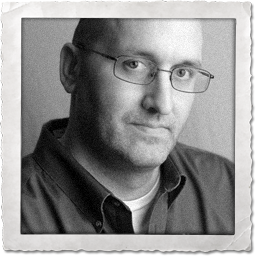 The Wake of Forgiveness introduced readers, last year, to a lean, highly intelligent prose artist of the first order. Men in the Making shows us that Machart is equally adept working with the short story form which, by his own admission, is both his point of departure and first love. I’m always hesitant, though, to oversell a book. Much can go wrong. In this case, I have little fear of readers building unrealistic expectations, particularly where The Wake of Forgiveness is concerned. The short stories, striking as they are, had little chance of equaling Machart’s startling debut novel but are, all the same, worth the reader’s investment. My real fear in lavishing praise is that the author will think that I’d either like to borrow his car or that I’m full of shit. I was able to dispel both suspicions, and to talk candidly with Machart about his work the night of his visit to Salt Lake City and, on and off, afterward.
The Wake of Forgiveness introduced readers, last year, to a lean, highly intelligent prose artist of the first order. Men in the Making shows us that Machart is equally adept working with the short story form which, by his own admission, is both his point of departure and first love. I’m always hesitant, though, to oversell a book. Much can go wrong. In this case, I have little fear of readers building unrealistic expectations, particularly where The Wake of Forgiveness is concerned. The short stories, striking as they are, had little chance of equaling Machart’s startling debut novel but are, all the same, worth the reader’s investment. My real fear in lavishing praise is that the author will think that I’d either like to borrow his car or that I’m full of shit. I was able to dispel both suspicions, and to talk candidly with Machart about his work the night of his visit to Salt Lake City and, on and off, afterward.
Interview
Aaron Cance: I think a good point of departure in our discussion of your work would be the keen interest demonstrated in both the novel and in your short stories in exploring our bifurcated existence. You seem very much drawn to explore the tenuous balance that we all must maintain between our physical existence and the beings that seem to exist within, and yet somehow beyond, our physicality.
Bruce Machart: That seems fair to me. Eudora Welty called place the “lesser angel” of fiction, by which she meant, I must assume, that character is the arc-angel. For me, it seems that you can’t really have one without the other.
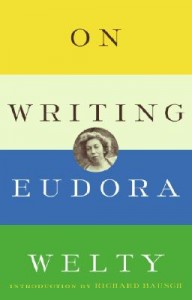 And as your characters grow and change, as they evolve, they all seem to find themselves navigating, as they are best capable, the uncharted space between these two aspects of being.
And as your characters grow and change, as they evolve, they all seem to find themselves navigating, as they are best capable, the uncharted space between these two aspects of being.
Feelings, reactions to conflicts, thoughts – all of them are intertwined vitally in the two places each of us inhabits at once: where we are now and where we are from.
Which is what gives your character Karel Skala such extraordinary depth. Your choice to stage the narrative in three distinct periods of Karel’s life allows your readers to follow his development with a keener understanding of important past events that have shaped him than might have been possible with a single, continuous fictional timeline.
I hope that’s true. I think the structure of the novel has given some readers fits, but it came to me rather instinctively (unlike so much of what I do), and with very few exceptions, the reader discovers the characters’ dramatic present and history in much the same way I did.
So Karel became more and more fully realized in the three different time periods of the book simultaneously, developing, in each of these periods, uniquely, with fidelity to who he was at that point in his life.
Once I realized how and why I’d structured the book that way I had, I went back [to each piece] to ensure a kind of three-part narrative arc. I hope that it works to instill, in the novel, the kind of time-bound conflict that Karel experiences.
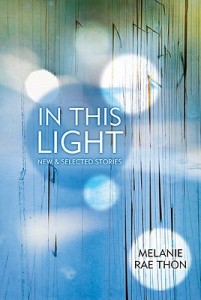 A friend and mentor of yours, Melanie Rae Thon, at the University of Utah, in a description of character development process, once explained to me that she thought of her characters as very real people, that as a work progressed she became better and better acquainted with them. She was able to discover them as she worked. You seem to have created three variations of Karel simultaneously, which sounds inordinately more difficult than simply fleshing out a character, simply creating someone.
A friend and mentor of yours, Melanie Rae Thon, at the University of Utah, in a description of character development process, once explained to me that she thought of her characters as very real people, that as a work progressed she became better and better acquainted with them. She was able to discover them as she worked. You seem to have created three variations of Karel simultaneously, which sounds inordinately more difficult than simply fleshing out a character, simply creating someone.
Steinbeck once wrote that “a good writer always works toward the impossible.” To me, the evocation of the complex and instrumental and numerous intersections of our exterior and interior landscapes is one of those “impossibilities” that we must try, knowing we will likely fail, to render faithfully.
In a great many places in the novel, you seem to have emphasized a brutal and inescapable physicality in your characters. In some places it manifests itself through circumstances in which they take on the roles of animals, such as the scene where the Skala boys are actually strapped to the plow, as beasts of burden, while their father digs along behind them. In other places, simple parallels are created. Sophie, for example, is described as “a good woman [who] . . . endured the indiscretions the way a good horse will endure shoeing and hard harness work.” Are these narrative devices used as counterweights to the book’s more spiritual underpinnings?
You know, I don’t really know. This seems to me to be more the kind of detail-oriented inquiry that I think is better left to readers to make. Who was it that said that we should trust the art, not the artist? That always seemed like good advice to me.
I have heard that expression, although I couldn’t tell you who coined it. I guess you would lean more, then, toward Roland Barthes’ notion that the author/artist ceases to give meaning to the work when it leaves his or her hands, and lands in the hands of the reader?
I do, but that sounds as if there is some finality to the author’s role. There is, I think, but only after the reader has turned the final page. I have made some mistakes, undoubtedly, negligence of research, and the like.
Well sure, at some point, your involvement in the work, as a piece of art, comes to a complete end.
Right. Once the book becomes a product, and someone pays for that product and takes it home, my opportunity to shape it has passed. And that’s exactly as it should be. If the book works, one would hope that it works on numerous levels, that it “contains multitudes,” but I have to accept the probability that, for some, there may be impediments, entirely of my making, to the suspension of disbelief that may prevent even the first reading.
It really must be a bit disconcerting, as a published writer, to trust that you’ve “stoked the coals” of the book enough that readers will find what you’d like them to.
It worries me to some extent, this notion that I may have failed. I certainly may have on some level. I think that it’s all but unavoidable because of the nature of the form.
But what is important is that some arc of narrative transmission has taken place, some direct transmission has taken place between you and your readers. You have created a strong, energetic piece of art that you can set free in the world.
If you don’t mind, I’d really like unpack the notion of physicality in your work a little further. I think that the places in both your novel and your collection of short stories where your characters are behaving most like animals, these places really hold a mirror up to that part of our nature.
I think that’s right. What I really do believe is that we have too much of a sense of our own superiority in the world of beasts, in the physical world, in a world that is far greater than our ability to understand it.
These characters remind us that, at the end of the day, we are not as refined as we might think we are.
But that is what we are. We are highly evolved animals. But, that being said, I do believe that these [experiential] moments are a function of what I said earlier: a farm boy, a farmer, a rural woman—all of these will likely see the world around them, and the worlds within them, vis-à-vis the landscape in which they live.
The men in the novel seem to rear their children the same way they would train a horse. An untrained horse must be broken, then nurtured.
In regard to this, I really appreciate what one reader has said, that the Skala boys are literally tethered to the earth. This is the kind of metaphorical nuance that comes when I write, largely, from the subconscious . . . which seems to me the well from which I draw most of my better scenes and sentences.
In more than one place in The Wake of Forgiveness, the relationship between fathers and sons pivots on the whip. Karel and his brothers are strapped into the plow harness and are actually lashed to work, and to the land. For Karel, the whip is “the closest he ever gets to his father’s touch.” Shortly after the Skala/Dalton race is over, Patrick Dalton, infuriated at his loss, borrows Skala’s whip to use on his own son. This Father/Son relationship that is realized through the whip, and the sense of sacrifice that lies beneath the surface seems, to me, to have religious underpinnings. You spoke to that when we were out, after your reading.
I was raised a Catholic, and I am still a practicing, if sometimes failed and hesitant, Catholic. Some of that conflicted appreciation for things sacramental and ritualistic have found their way, probably unconsciously, into the work.
So there is an interconnectedness between the subconscious well that you draw from and your own conscious beliefs.
There always has been, for me. My stories, too, find these thematic gasses bubbling to the surface from the submerged bedrock of my faith and my own questions about faith. The whips in the story aren’t conscious symbols of flagellation or the Passion, but I wouldn’t guess that that particular reading is anything other than valid, nonetheless.
Some of the short stories in Men in the Making are also about fathers and sons. In “What You’re Walking around Without,” Dean Covin and John Dalton have a tenuous father/son relationship and “We Don’t Talk That Way in Texas” explores some of the more difficult aspects of the father/son relationship through three generations. In “The Last One Left in Arkansas,” the story revolves around Tom’s relationship with his wife and two boys, and, returning to the notion of animal parallels, the Labradors, Bo and Luke, are shadow images of Tom’s boys in the story, Mattie and Nate, and the two dogs share as close a bond as the boys.
We’re all raised on stories of fathers and sons, and some of the universally resonant stories of the Bible feature the dissolution and/or conflicts made manifest by these filial relationships. We are asked by our fathers, at some point, to suffer. It pains them to ask it of us, to surrender us to it, to resign themselves to witnessing it, but there’s not a reasonably self-aware person on earth who doesn’t recognize, at some point, the necessity of human suffering.
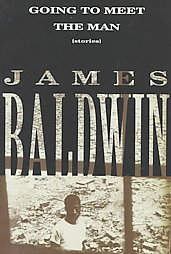 But it’s not always without its own purpose.
But it’s not always without its own purpose.
Certainly not. Whether it acts as the relief against which we can experience joy, or simply as the means by which we gain the humility that spawns empathy, or as the common experience that renders human experience “knowable.” As Sonny says in [James] Baldwin’s short story, “Sonny’s Blues,” “No, there’s no way not to suffer.”
It’s an unavoidable part of the human condition. Let me ask you this: what influence do you think your own relationship with your father or with your son has had on your writing?
Father/son relationships are fraught with tension. And this does not, to my mind, preclude love or affection or strong bonds. But when I look back at my childhood, I remember how BIG my father seemed. He was physically big and capacious and omniscient and omnipresent . . . and how does a boy ever grow up to equal that? Now that I’m a father, I am struck by the way my son puts his hand palm to palm with my own, taking these measurements, and I know at least part of what he is thinking, what he’s feeling. I’m a better writer for my experiences as a father, but being a son is all you really need. Feeling small, feeling desires without any ability to satisfy them, being dependent, being egocentric in an expansive and indifferent world—this is all you need to experience to know where good stories come from. They come from longing and self-doubt. I sometimes wonder what would happen if we could protect our sons and daughters from their own desires. Would we save them or destroy them?
It’s really interesting, to me, that you’ve couched it that way. The stories in Men in the Making seem to meditate heavily on notions of what it is to be a man in today’s world. The most painful part of this meditation seems to be the realization of your male protagonists that they are unable, ultimately, to protect the ones they love from the “expansive and indifferent world” that you’ve spoken of, and their painful reconciliation with that inability.
Absolutely.
We’ve spent quite a bit of time discussing some of the more metaphysical aspects of your writing, and of writing in general. I think what I’d really like to wrap up our time together with is a few questions about the physical mechanics of the craft. You mentioned to me, at one point, that when you signed on with Houghton Mifflin for your novel, The Wake of Forgiveness, that the deal also included your short story collection, Men in the Making, which will be released October 25. In your formative years, as a writer, did you visualize yourself as a novelist or were you primarily at work on short stories? Were the stories a form that you consider your starting point, or were the seeds of the novel already slowly germinating?
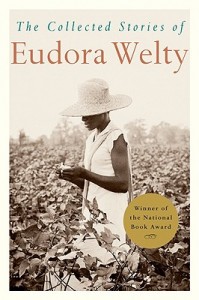 Short stories are my first love. I started fumbling around with stories because I read Eudora Welty’s story “Powerhouse,” and I wanted to know how and why it worked such magic on me. Most of the stories in Men in the Making were written before I went to work on the novel, and I’ve always found myself incapable of working on more than one project at a time. I don’t know which parts, if any, of The Wake of Forgiveness were there all along. I don’t know if I really even believe in latent stories, stories lying in wait for us to become big enough or experienced enough or insightful enough to find them. I suppose that I find self-awareness vital to personal and social development, but it’s crippling for me as a writer. If I know why the hell I’m writing a story while I’m writing it, then I can’t imagine spending the time to get it on the page. There would be no point.
Short stories are my first love. I started fumbling around with stories because I read Eudora Welty’s story “Powerhouse,” and I wanted to know how and why it worked such magic on me. Most of the stories in Men in the Making were written before I went to work on the novel, and I’ve always found myself incapable of working on more than one project at a time. I don’t know which parts, if any, of The Wake of Forgiveness were there all along. I don’t know if I really even believe in latent stories, stories lying in wait for us to become big enough or experienced enough or insightful enough to find them. I suppose that I find self-awareness vital to personal and social development, but it’s crippling for me as a writer. If I know why the hell I’m writing a story while I’m writing it, then I can’t imagine spending the time to get it on the page. There would be no point.
Could you describe your process? Some writers work extremely methodically, and with a great deal of discipline (which no one in his or her right mind would dismiss as unimportant) reserving the same two or three hours (or more) a day for nothing but writing. Some writers are struck by periodic bursts of inspiration, and write in streaks. Most, I think, lie somewhere between these two poles. How would you describe how it works for you?
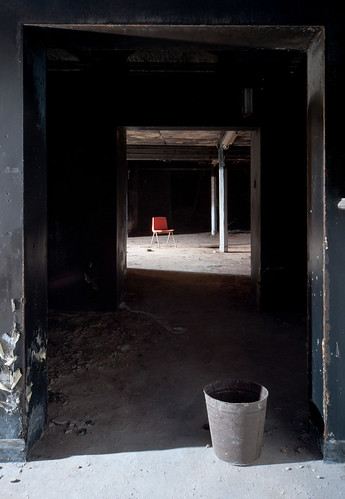 I’ve recently moved to New England, where they have these wonderful and damp and dark things called basements (no such thing in Houston), and I have a great metaphor for this: I am a sump pump. I wait while my understanding of the lives of the characters fills the unlit basement of my imagination, and then I pump it out in a few loud, violent surges. I suspect that I give my editor and agent fits when they call or email after a month has gone by, asking how a story is coming, and I tell them that I’ve made no progress. But the truth is, I’m still there . . .the pump is still plugged in the electricity is connected. I’m down there in the dark where I belong. It’s just that there’s not yet enough water to worry about. When I was at work on The Wake of Forgiveness, I often went weeks at a time without writing even a sentence . . . but then wrote the last seventy-five pages in a little over a week’s time.
I’ve recently moved to New England, where they have these wonderful and damp and dark things called basements (no such thing in Houston), and I have a great metaphor for this: I am a sump pump. I wait while my understanding of the lives of the characters fills the unlit basement of my imagination, and then I pump it out in a few loud, violent surges. I suspect that I give my editor and agent fits when they call or email after a month has gone by, asking how a story is coming, and I tell them that I’ve made no progress. But the truth is, I’m still there . . .the pump is still plugged in the electricity is connected. I’m down there in the dark where I belong. It’s just that there’s not yet enough water to worry about. When I was at work on The Wake of Forgiveness, I often went weeks at a time without writing even a sentence . . . but then wrote the last seventy-five pages in a little over a week’s time.
I’ll close with the question that you’ve probably heard more than any other, particularly out on the road touring for the novel. Who would you say your two or three biggest influences were? What singular gift did you receive from each of them?
Faulkner and Welty for the unapologetic lyricism and the attention to the way place inhabits character just as surely as character inhabits place; Richard Yates and Andre Dubus for their unwavering empathy for their characters . . . and my financée, Marya, who is at work on her first novel. When I come down the stairs at 5:30 am, she’s already there with the story working its way out of her and onto the page. It’s humbling. I know that I’ve done it, and know that I will do it again, but I still come down the stairs thinking, God, I wish I could do that. She teaches me, reminds me, how to want the story, how to lose oneself in it, how to surrender to it.
Are you working on a new book now?
Yes, a new novel called Until Daylight Delivers Me. There’s water in the basement. Not enough yet, but it’s rising steadily.
Further Links and Resources
- >> Mary Stewart Atwell interviews Kevin Brockmeier
- >> Steven Wingate interviews Andrew Krivak, whose novel has just been nominated for the National Book Award.
- >> Carolyn Gan interviews Edwidge Danticat
- >> Or, consider Joshua Bodwell’s essay on the problem of autobiography in Andre Dubus, one of Machart’s influences.
Watch an interview with Bruce Machart with Joe Viglione on Visual Radio:

